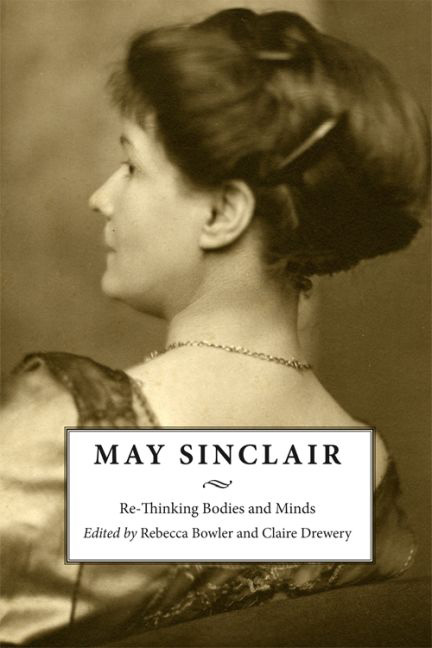Book contents
- Frontmatter
- Contents
- Acknowledgements
- Introduction: May Sinclair's Interdisciplinarity
- Part I The Abstract Intellect
- Part II Abject Bodies
- 6 Disembodying Desire: Ontological Fantasy, Libidinal Anxiety and the Erotics of Renunciation in May Sinclair
- 7 May Sinclair and Physical Culture: Fit Greeks and Flabby Victorians
- 8 Dolls and Dead Babies: Victorian Motherhood in May Sinclair's Life and Death of Harriett Frean
- 9 Why British Society Had to ‘Get a Young Virgin Sacrificed:’ Sacrificial Destiny in The Tree of Heaven
- 10 ‘Odd How the War Changes Us’: May Sinclair and Women's War Work
- 11 Transgressing Boundaries; Transcending Bodies: Sublimation and the Abject Corpus in Uncanny Stories and Tales Told by Simpson
- Notes on Contributors
- Index
11 - Transgressing Boundaries; Transcending Bodies: Sublimation and the Abject Corpus in Uncanny Stories and Tales Told by Simpson
from Part II - Abject Bodies
Published online by Cambridge University Press: 26 May 2017
- Frontmatter
- Contents
- Acknowledgements
- Introduction: May Sinclair's Interdisciplinarity
- Part I The Abstract Intellect
- Part II Abject Bodies
- 6 Disembodying Desire: Ontological Fantasy, Libidinal Anxiety and the Erotics of Renunciation in May Sinclair
- 7 May Sinclair and Physical Culture: Fit Greeks and Flabby Victorians
- 8 Dolls and Dead Babies: Victorian Motherhood in May Sinclair's Life and Death of Harriett Frean
- 9 Why British Society Had to ‘Get a Young Virgin Sacrificed:’ Sacrificial Destiny in The Tree of Heaven
- 10 ‘Odd How the War Changes Us’: May Sinclair and Women's War Work
- 11 Transgressing Boundaries; Transcending Bodies: Sublimation and the Abject Corpus in Uncanny Stories and Tales Told by Simpson
- Notes on Contributors
- Index
Summary
The short fiction of May Sinclair reveals a sustained fascination with the transgressive power residing within physical, intellectual and cultural boundaries. A noteworthy feature of two of her short-story collections in particular, Uncanny Stories (1923) and Tales Told by Simpson (1930), is the repeated violation and disruption of border-states; conveyed through striking and frequently voyeuristic representations of gratuitous violence perpetrated against physical and aesthetic bodies. Visual and textual artefacts are typically depicted as disjointed, incomplete or imperfect and are consistently juxtaposed with disfigured, grotesque or discorporated physical forms. These representations, this chapter will argue, are underscored by a continual aesthetic tension between the spiritual form of subjective consciousness frequently associated with the modernist epiphany – in Sinclair's writing represented as spiritual and pure – and physical, corporeal sexuality, which, conversely, she depicts as repellent, distorted and grotesque. For Sinclair, this tension resides within cultural and subjective border-sites which are threatening; liminal; abject. All are evocative of the revulsion which Julia Kristeva, in her much later essay Powers of Horror, identifies as arising from the corporeal boundaries of the human subject: for her the locus of ‘what disturbs identity, system, order. What does not respect borders, positions, rules. The in-between, the ambiguous, the composite’ (1982: 4).
This chapter will suggest a close affinity between Sinclair's representations of the abject borders of the physical and textual corpus and her aesthetic of sublimation, which connects sexuality to art through the channelling of the libido into artistic creation. This seeming paradox is informed by Sinclair's interest in Freudian theories of sublimation as elucidated in ‘“Civilised” Sexual Morality and Modern Nervousness’, in which he claims that sexual instinctual forces are deflected ‘away from their sexual aim to higher cultural aims’ (1959: 193). Significantly, in this essay Freud locates sublimation's end result within the sphere of artistic creation; the locus Sinclair privileges in her claim that ‘the striving of the Libido towards manifestation in higher and higher forms’ is realised within ‘innumerable religious and artistic texts’ (1916a: 119). Through these cultural and aesthetic means is declared ‘the unity of all things in the Absolute’ ; a term she uses interchangeably with the idea of the ‘ultimate reality’ she believed existed behind and beyond material surfaces (1917: 272; 1916b: 144).
- Type
- Chapter
- Information
- May SinclairRe-Thinking Bodies and Minds, pp. 213 - 231Publisher: Edinburgh University PressPrint publication year: 2017



